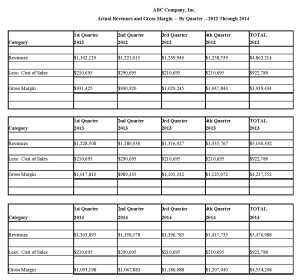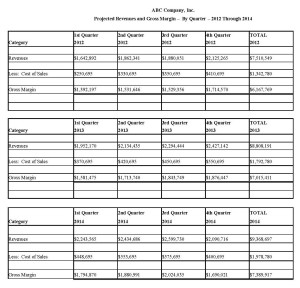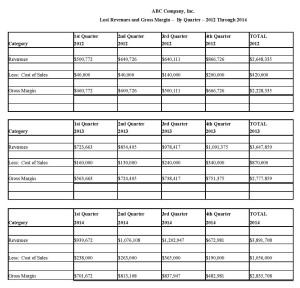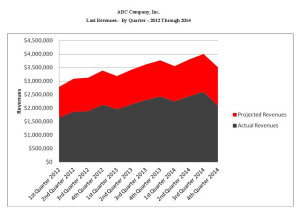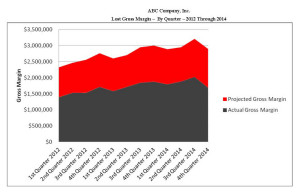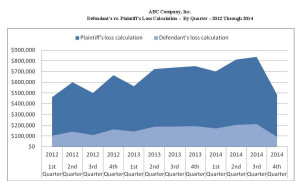David Anderson is principal of David Anderson & Associates, a Philadelphia forensic accounting firm that provides a full range of fraud investigation, fraud deterrence, litigation support and expert witness testimony services in Philadelphia and the Delaware Valley.
When you learn a company is “associated” with an accounting firm, don’t automatically assume the financial statements that are issued as part of that relationship are necessarily reliable, are fairly presented, or have been rigorously examined, said David Anderson, principal of David Anderson & Associates, a Philadelphia forensic accounting firm that provides a full range of fraud investigation and fraud deterrence programs in the Delaware Valley.
“Simply being ‘associated’ with an Accounting Firm does not mean the financial statement has undergone a thorough examination for reliability,” Anderson said. “Investors, litigants and other interested parties need to understand the true implications of having Accounting Firms ‘associated’ with financial statements.”
Anderson, a forensic accountant in Philadelphia who also is a Certified Fraud Examiner in Philadelphia, said there are four primary ways in which an Accounting Firm is “associated” with financial statements:
- when the financial statements are in a binder with the name of the accounting firm on it;
- when the accounting firm performs a compilation;
- when the accounting firm performs a review; and
- when the accounting firm performs an audit.
Binders
Anderson said Accounting Firms provide clients with some form of financial statements in a binder usually when the Accounting Firm is performing a special analysis or projection for internal use only. These types of financial statements usually do not reflect actual financial performance, and are referred to as “pro-forma,” he said.
Financial statements found in a binder usually are stamped with the words “Confidential,” “Unaudited” and/or “For Internal Use Only,” Anderson noted. Accounting Firms usually do not verify or authenticate the underlying information used in “pro-forma” financial statements, said Anderson, a forensic accounting expert in Philadelphia. Furthermore, he added, the Accounting Firm generally does not issue a letter to accompany these financial statements (other than perhaps a transmittal letter).
Compilations
Compilations performed by an Accounting Firm and accompanied by a Compilation letter are limited to presenting information that is the representation of management, Anderson explained. Substantially all disclosures and financial statement notes are usually omitted from a Compilation, he said.
The Accounting Firm does not audit or review the statements, does not express any opinion about presentation of the information in the statements and provides no assurance about their reliability, according to Anderson, a forensic accountant in Philadelphia whose firm provides a full range of forensic accounting services in Philadelphia and the Delaware Valley.
Reviews
Reviews, accompanied by corresponding Review letters, consist primarily of inquiries of company personnel and analysis of the financial statements, including ratio analysis, explained Anderson, a forensic accounting expert in Philadelphia who also is a Certified Fraud Examiner in Philadelphia.
The Accounting Firm does not perform any audit procedures and does not express an opinion about presentation of the information contained in the financial statements, he said. However, the Accounting Firm does provide limited assurance that the financial statements do not require any material modification, Anderson noted.
Audits
Audits performed by an Accounting Firm, which also produces an accompanying Audit letter, are detailed examinations of financial statements intended to provide assurance that the financial statements are free of material misstatement, Anderson explained. The Accounting Firm expresses an opinion that the financial statements present fairly, in all material respects, the financial position of the company, he said.
However, Anderson cautioned, an Audit does not guarantee there is no fraud. He said fraud may be present but not identified by the Accounting Firm if: (1) there is management collusion (such as with Enron, Tyco International, WorldCom, etc.); (2) there is management override of internal controls (such as with Adelphia Communications and HealthSouth Corporation); (3) the Accounting Firm fails to adequately plan and execute the audit (such as with ZZZZBest); or (4) the Accounting Firm or its affiliates earn significant non-audit fees from the company (such as with Enron and Bernard L Madoff Investment Securities, LLC).
An Accounting Firm also may perform an Audit and issue an Audit letter that questions the ability of the company to continue in business, said Anderson, a forensic accountant in Philadelphia who recommends that every company enact a comprehensive fraud deterrence program developed by an experienced firm that provides forensic accounting services in Philadelphia and the Delaware Valley. This type of Audit letter is known as a “Going Concern” audit letter, according to Anderson.
“When considering financial statements with which an Accounting Firm is “associated, it is critically important to carefully read any accompanying letter from the Accounting Firm,” Anderson said. “These letters provide insight regarding the degree to which the Accounting Firm has performed assurance services, if any.”
Anderson, who has conducted numerous fraud investigations, also recommends the recipient carefully analyze the financial statements themselves, along with notes to financial statements and supplemental schedules, if any, to gain a more complete understanding of the statements.
If you require the services of a forensic accountant, a Certified Fraud Examiner, or any other financial expert to help with disaster planning or other accounting services in Philadelphia and the Delaware Valley, please contact the Philadelphia forensic accounting firm of David Anderson & Associates by calling David Anderson at 267-207-3597 or emailing him at david@davidandersonassociates.com.
About David Anderson & Associates
David Anderson & Associates is a Philadelphia forensic accounting firm that provides a full range of forensic accounting services in Philadelphia and the Delaware Valley. The experienced professionals at David Anderson & Associates provide forensic accounting, business valuation, fraud investigation, litigation support, economic damage analysis, business consulting and outsourced CFO services. Company principal David Anderson has more than 30 years of experience in financial and operational leadership positions and is a Certified Public Accountant, a Certified Fraud Examiner and a Certified Valuation Analyst.

